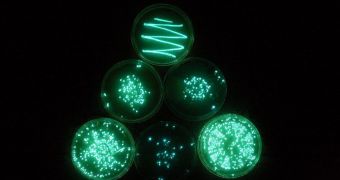Researchers finally managed to figure out why certain marine bacteria exhibit a phenomenon called bioluminescence. This is the scientific name for things that glow naturally. The benefits of this process on the bacteria were not known for certain until now.
In some aquatic microorganisms, bioluminescence only occurs when large populations achieve quorum sensing, which is a concept describing large concentrations. In other words, the bacteria only glow when sufficiently large numbers are present in the same area.
The glow manages to attract zooplankton, the microorganisms' primary predators. After consuming the tiny organisms, the zooplankton begin to glow themselves, a phenomenon that makes them a prime target for their predators, fish.
What scientists determined was that the bacteria's main goal is to reach the gut of fish. This provides them with easy access to nutrients and a safe place to endure. In addition, fish swim for much greater distances than what the bacteria would be able to travel on their own.
The team behind the new work also managed to determine that certain species of bioluminescent bacteria are able to endure passing through both zooplankton and fish without being destroyed, PhysOrg reports.
Details of the study appear in a paper entitled “Bacterial bioluminescence as a lure for marine zooplankton and fish,” which is published in the latest issue of the esteemed journal Proceedings of the National Academy of Sciences (PNAS).
Graduate student Margarita Zarubin carried out this research at the Interuniversity Institute for Marine Sciences, in Eilat, Isreal. She was supervised by the head of the Hebrew University of Jerusalem (HUJ) Department of Evolution, Systematics and Ecology, professor Amatzia Genin.
HUJ Silberman Institute of Life Sciences professor Shimshon Belkin and student Michael Ionescu also contributed to the research. The investigators conducted a series of experiments in the lab to validate the results they got in the field.
“As far as the bacteria are concerned, their access to the fish digestive systems is like reaching ‘paradise’ – a safe place, full of nutrients, and also a means of transport into the wide ocean,” Genin says.
“In the dark, deep ocean the quantity of food is very limited, therefore it is worthwhile for the zooplankton to take the risk of becoming glowing themselves when contacting and consuming the particle with glowing bacteria, since the profit of finding rare food there is greater than the danger of exposing themselves to the relatively rare presence of predatory fish,” the expert concludes.

 14 DAY TRIAL //
14 DAY TRIAL //